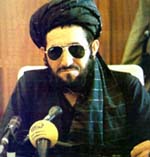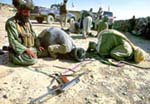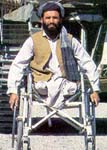|
The Rediff Special
The Crescent of Terrorism
 Indo-Pak relationships have often been likened to a duck on a placid
pond.
Indo-Pak relationships have often been likened to a duck on a placid
pond.
Everything looks calm and tranquil on the surface. But underneath, there
is some very busy paddling going on, a lot of mud is being churned up,
things are happening that are at total variance to the surface
appearance.
At no time is this assessment true as now. Thus, on the one hand, Prime
Minister Inder Kumar Gujral and Pakistani counterpart Nawaz Sharief,
together with top government officials, are attempting to normalise
relations between the two countries. And on the other, a devious plan to
to transport Islamic terrorism
across India and Afghanistan, as part of a long range bid to contain
India by subversion and secure
control of oil and gas flows from Central Asia, has come to light.
That has, for a while now, been the problem. That there is a startling
contradiction between Pakistan's public posture and private action. A
fact underlined by the US Task Force on Terrorism and Unconventional
Warfare, which has indicated that Pakistan's plans could endanger
security in the region. And in order to understand the issues involved,
we present this report:
 After the recent Pakistani elections, Nawaz Sharief, the new prime minister, promised a drastic change of course. Pakistan must concentrate on economic recovery and industrial development.
After the recent Pakistani elections, Nawaz Sharief, the new prime minister, promised a drastic change of course. Pakistan must concentrate on economic recovery and industrial development.
The two preconditions for the success of this urgent task are the reduction of tension with India through bilateral negotiations and the improvement of relations with the US to generate economic aid, both direct and via such international organisations as the IMF.
Senior Pakistani officials guaranteed that Islamabad would stop any involvement in, and tolerance of, Islamist terrorism and subversion activities on Pakistani soil.
These officials also anticipated a quick end to the Pakistani participation in, and sponsorship of, cross-border terrorism and subversion, specifically in Kashmir and Afghanistan.
Indeed, loyalists of Nawaz Sharief now acknowledge that the Afghan Taleban are "a creation" of the Benazir Bhutto administration, and promise that Islamabad will no longer embark on such adventures. Nawaz Sharief stressed his commitment to a renewed and rejuvenated dialogue with India toward the reduction of tension and improvement of relations.
He stated that Islamabad also strives to repair relations with Beijing and Tehran, soured over Islamabad's support for Islamist subversion in Xinjiang and anti-Shi'ite terrorism in both Pakistan and Afghanistan respectively.
Meanwhile, during his visit to Beijing in early May, Pakistani President Farooq Leghari repeated this commitment to his hosts. Concurrently, Pakistani security authorities arrested a dozen Uyghur activists studying in Pakistan and extradited them to the PRC.
 This was the first step in the ensuring suppression of Islamist terrorism in Pakistan, Pakistani officials were quick to suggest.
This was the first step in the ensuring suppression of Islamist terrorism in Pakistan, Pakistani officials were quick to suggest.
The reality, however, is different. The extent of Pakistan's continued sponsorship of Islamist terrorism and subversion has become clear during, and in the aftermath of, the ongoing Taleban fighting in northeastern Afghanistan. Already during the Taleban's early preparations for their offensive surge northwards, there was no doubt of the dominant role and singular importance of the Pakistani "support".
Indeed, the first indication of the forthcoming offensive came in the early spring of 1997, when Pakistan's Inter-Services Intelligence directorate markedly expanded its already major station in Kabul.
The Kabul station is under the command of Brigadier Ashraf Afridi. A Pushtun in his early fifties, Afridi is a key veteran of the active involvement of the ISI in Afghanistan.
During the 1980s, he was instrumental in the training of and support for, the key Pushtun-dominated Islamist Mujahedin force such as Gulbaddin Hekmatyar's Hizb-I-Islami. Little wonder that in September 1995 the Tajik-dominated Jamiat-I-Islami government demanded his ouster. Neither Afridi nor the ISI has forgotten the indignity of the Pakistani withdrawal from Kabul.
 In early 1996, after the Taleban suffered several military reversals on their march on Kabul, and with the overall situation evolving into a bloody stalemate, Islamabad resolved to reverse the situation.
In early 1996, after the Taleban suffered several military reversals on their march on Kabul, and with the overall situation evolving into a bloody stalemate, Islamabad resolved to reverse the situation.
Brigadier Ashraf Afridi was nominated to head a team of ISI veterans of the Afghan jihad to rebuild the Taleban's military forces. By July, Afridi and a small team of Pakistani military advisers established a command centre at the main Taleban camp south-west of Kabul.
From there, they orchestrated the final assault on Kabul later in the fall.
A former Pakistani minister in the Bhutto government noted that the final assault on Kabul in late September 1996 "took place at night so as to conceal the large number of Pakistanis who had volunteered their services and the considerable number of professional military advisers who directed the capture of key positions."
By the early spring of 1997, Brigadier Ashraf Afridi and a large support staff were fully entrenched in Kabul. From there, they were now co-ordinating the flow of vast quantities of arms and logistical supplies to the Taleban.
Anticipating a major offensive, the Pakistanis not only exhausted the stockpiles of the military depots in Peshawar, traditionally earmarked for operations in Afghanistan, but began drawing large quantities of weapons and ammunition from the country's strategic reserves stored in Rawalpindi.
Pushtu-speaking Pakistani military officers and NCOs, disguised as Afghans, accompanied the weapons to the Taleban's front-line positions where they trained the Afghan forces and assumed direct command over key sectors of the front.
 ISI operatives brought with them large quantities of money which they and the local senior commanders dispensed in order to "enhance" the loyalty of locally-based Mujahedin forces.
ISI operatives brought with them large quantities of money which they and the local senior commanders dispensed in order to "enhance" the loyalty of locally-based Mujahedin forces.
Meanwhile, the ISI's Afghan Bureau assumed responsibility for the logistics support, political brokering and operational planing of the Taleban's war effort.
A massive flow of reinforcements, initially in the form of "volunteers" from madarssas and recruits from Afghan refugee camps, began. These supplies were delivered in brand new Pakistani-produced Nissan pick-up trucks (of the type heavily used during the 1980s by ISI-sponsored Mujahedin units).
As the Taleban offensive neared, the ISI arranged for thousands of Pakistani madarssas students travelled to the Kabul area by the bus-load. ISI officers deployed them within the ranks of the Taleban forces. All together, between 2,500 and 3,000 Pakistani volunteers reinforced the Taleban in the first phase alone.
More important was the growing presence of "Pakistani ex-servicemen" serving as advisers and equipment maintenance crews. The death in a helicopter crash in the Taleban held area of a number of Pakistani officers still on active service, including a brother of General Aslam Beg, the former Pakistani army chief, testifies to the extent of Islamabad's direct involvement.
 However, the ISI was not satisfied with the overall performance of their Afghan protégés. Given the high quality of the forces of both General Abdul Rashid Dostam and Ahmad Shah Masoud facing the Taleban, Islamabad concluded that there was no substitute to the deployment of regular units.
However, the ISI was not satisfied with the overall performance of their Afghan protégés. Given the high quality of the forces of both General Abdul Rashid Dostam and Ahmad Shah Masoud facing the Taleban, Islamabad concluded that there was no substitute to the deployment of regular units.
Indeed, starting in mid-April 1997, the build-up of Pakistani troops in the Kabul area was noted. Mohammad Mohaqiq, then General Dostam's deputy, reported that more than 5,000 Pakistani troops, as well as a large number of fresh Taleban forces, arrived in Kabul in preparation for the attack on the opposition forces. In mid-May, the intelligence units of both Dostam and Masoud confirmed that "fresh Pakistani military units have now arrived in Kabul."
The new troops were identified as "competent Urdu-speaking soldiers from Pakistan's Punjab province" even though they declared themselves to be Pakistani madarssas students.
The first of Pakistan's organised bolstering of the Taleban's military forces began in Spinboldak, in the southern province of Kandahar. Soon afterwards, a Pakistani brigade was stationed in the Khairkhana hills, with its base at the headquarters of the former Afghan 16th armoured division. Some of these Pakistani troops are veterans of earlier fighting in Parwan and Kapisa provinces.
Still, Islamabad was looking for a panacea that would secure victory without the anticipated heavy fighting. In late May, Brigadier Ashraf Afridi and a senior delegation of the ISI negotiated a transfer of power with the ambitious General Abdul Malik. Malik agreed to betray his leader and commander -- Dostam -- in return for a fiefdom under the Taleban's rule. Malik's sudden perfidy enabled a mixed force of Pakistanis and the Taleban to enter Mazar-e-Sharief in late May. With his defence lines crumbling without a fight, Dostam and some 120 senior officers and officials escaped to exile in Turkey and Uzbekistan.
Once in Mazar-e-Sharief, the Taleban had no intention honouring the ISI's promises to Malik and their other leaders in northern Afghanistan. Facing a crowd of Uzbeks forced into the central mosque in Mazar-e-Sharief at gunpoint, Qazi Gargari, the Taleban commander declared in Pushtu, a language the local population does not understand, that "A new order has begun. True Islam has arrived in northern Afghanistan." This act alone alienated the local population. Moreover, the Taleban brought in Abdul Razzaq, the ruthless governor of Herat, notorious for the violent purge of both Ismail Khan's forces and the Shi'ite Hazarah, to oversee the establishment of "true Islam" in northern Afghanistan.
 Fearing an imminent arrest or assassination, Malik and his forces regrouped and attacked the Taleban. Spontaneous riots erupted in Mazar-e-Sharief as Malik's Uzbek and Shi'ite units attacked the local Taleban garrison, killing over 300 Afghan and Pakistani fighters. The rest had to flee the town.
Fearing an imminent arrest or assassination, Malik and his forces regrouped and attacked the Taleban. Spontaneous riots erupted in Mazar-e-Sharief as Malik's Uzbek and Shi'ite units attacked the local Taleban garrison, killing over 300 Afghan and Pakistani fighters. The rest had to flee the town.
The news of this sudden and unprecedented defeat of the Taleban served as a signal for a general anti-Taleban uprising throughout the north. In many towns, the mob simply attacked and killed any Pushtun in sight.
Joining forces with Masoud, and using fresh supplies of weapons coming from across the Amu-Dariyah, Malik's forces pushed the Taleban back to the gates of Kabul in early June. It is in coping with this crisis that the full extent of the Pakistani involvement and support becomes apparent.
Starting May 30, numerous Taleban leaders travelled to madarssas in northern Pakistan asking for support in the jihad to avenge the recent setbacks.
Consequently, the local madarssa leaders ordered the closure of the schools so that the Pakistani students -- Taleban in Urdu -- could join their brethren at the front. The ISI arranged for buses to transport the volunteers, as well as trucks full of weapons and ammunition for them. By they reached the front north of Kabul, these Pakistani Taleban were already transformed into fully organised, competently-led, and well-equipped units.
Meanwhile, Pakistani Special Forces -- commandos -- have launched a series of raids in the enemy rear aimed at disrupting their defences. Many were killed or captured in a series of intense clashes.
Fazil, a senior official of the Shi'ite Wahdat-I-Islami Party in the Hazarajat, estimated that Pakistani captives constitute about half the prisoners his units captured in clashes with the Taleban forces in late May.
Masoud's intelligence officers reported that they were holding "more than 70 Pakistani army officers" among their prisoners. One of them stressed that "these officers held Pakistani identity cards at the time of their capture by the anti-Taleban forces." By early June, there was a sudden increase in both the size and quality of the Taleban's tank and artillery forces. Numerous T-55s and high quality troops appeared in such key segments of the front as Jabal Siraj on the northern gateway to Kabul.
These forces spearhead what appears to be last minute preparations for a major Taleban offensive against the Masoud-Malik forces. Brigadier Ashraf Afridi and his staff seem to be in command of these preparations. The large-scale Pakistani involvement in Afghanistan is a direct result of two vital issues for Islamabad:
*Securing the flow of oil and gas from Central Asia in pursuit of the Trans-Asian Axis strategy: and
* Deterrence to, and containment of, India through the escalation of Islamist terrorism and subversion.
 Islamabad's determination to secure the future flow of large quantities of oil and gas through a pipeline system from Central Asia via Turkmenistan and Afghanistan to Pakistani ports on the Indian
Ocean is an integral component of the People Republic of China's grand design -- the quest to establish hegemony over east Asia by consolidating control over the region's energy resources and supplies. Indeed, Pakistan does not need the energy resources the proposed pipelines will carry. Currently, Pakistan even has excess of electric power. At the recent SAARC summit, Nawaz Sharief offered Indian Prime Minister Gujral that Pakistan sells electricity to India.
Islamabad's determination to secure the future flow of large quantities of oil and gas through a pipeline system from Central Asia via Turkmenistan and Afghanistan to Pakistani ports on the Indian
Ocean is an integral component of the People Republic of China's grand design -- the quest to establish hegemony over east Asia by consolidating control over the region's energy resources and supplies. Indeed, Pakistan does not need the energy resources the proposed pipelines will carry. Currently, Pakistan even has excess of electric power. At the recent SAARC summit, Nawaz Sharief offered Indian Prime Minister Gujral that Pakistan sells electricity to India.
Thus, the key strategic requirement motivating Islamabad's drive is the need to divert the central Asian oil and gas eastward -- away from Russia and the West.
Therefore, given the grand strategic importance of these energy supplies, Islamabad must be in full control over the Afghan segment of the pipeline.
Hence, Pakistan is committed not only to the continued support for the Taleban, but to ultimately impose a long-term political solution in Afghanistan, thus ensuring Islamabad's dominance. At present, the leading Pakistani political initiative is to establish in Kabul Gulbaddin Hekmatyar and General Shahnawaz Tanai -- old proteges of the Zia-ul Haq and Nawaz Sharief camp.
The grand pan-Islamic plan
Tell us what you think of this feature
|



